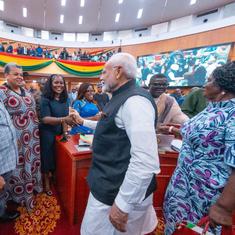Over the past couple of days, the alleged misdeeds of NGOs have been hotly debated in television studios and on the social media. The storm was set off by a series in The Indian Express, revealing that a 21-page Intelligence Bureau report has claimed that foreign-funded non-governmental organisations have been “negatively impacting economic development”.
The newspaper said that the environmental group Greenpeace had been singled out for attention, as had other groups agitating against nuclear power projects, mining plans and attempting to organise construction labour. It has since transpired that a portion of the IB report plagiarised portions of a speech delivered by Narendra Modi in 2006 to mark the launch of a book called NGOs, Activists & Foreign Funds: Anti-Nation Industry.
The Express series has triggered an outcry against all NGOs, which are being denounced with special vehemence on Twitter as frauds and scoundrels, as anti-national entities that are dishonest about the source of their funding. The critics seem blind to the transformative role played by non-profits such as the women’s group SEWA and the child-support service Childline, among others.
There is some irony to this. The mushrooming of NGOs in recent decades is a direct consequence of the neoliberal philosophy of which Prime Minister Narendra Modi is a passionate advocate. As in the west, NGOs are filling the holes in social services created by minimal governments aspiring to maximum governance. NGOs are a cornerstone of the public-private partnerships for social development that are seen as a vital part of this economic model. Other non-profits are adjuncts of the corporate world, established to avail of tax breaks for corporate social responsibility initiatives.
Amidst this debate about non-profits, one fact seems to have gone largely unremarked upon: India’s biggest NGO, one that played a crucial role in installing Modi as prime minister, also receives foreign funds.
The Rashtriya Swayamsevak Sangh, which has an estimated 2.5 million members, created an army of panna prabharis to help Modi during the election campaign. Each prabhari was entrusted with contacting voters on a single page of the electoral rolls and getting them to the polling booth. As Scroll.in has reported, this strategy paid rich dividends.
Modi’s wariness of foreign-funded NGOs evidently does not extend to the RSS, of which he has been a member since 1971. In 2002, a report titled The Foreign Exchange of Hate: IDRF and the American Funding of Hindutva, put together by a group called The Campaign To Stop Funding Hate, documented how the India Development and Relief Fund, a charity based in the US state of Maryland, was funnelling funds to Sangh institutions in India. It claimed that the IDRF had sent more than $3 million to Sangh institutions in the seven years before the report was published.
With NGOs being put under the scanner, this may be a good time to officially scrutinise the funding of the Brotherhood in Saffron.
An unnoticed fact: the RSS, India’s biggest NGO, gets foreign funding too
In 2002, a citizens' report documented how a US-based charity was funneling funds to Sangh entities in India.










